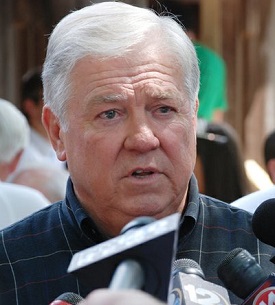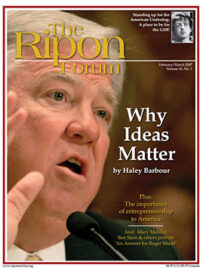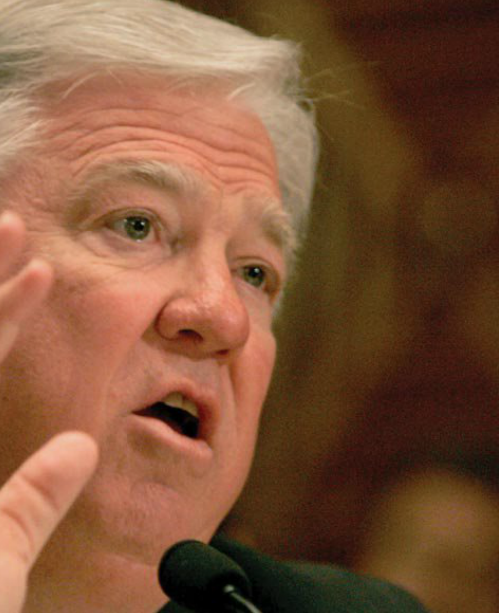
“Ideas matter,” said Margaret Thatcher on her march to become Britain’s Prime Minister in the late 1970’s. For some of us, that was not very long ago. We can recall the steely confidence she maintained in the face of long odds and the advice to avoid alienating voters by presenting clear thoughts about what needed to be done to reverse the downward spiral her country had seemed unable to end.
Mrs. Thatcher understood that, in a democracy, what excites voters and makes them activists is the chance to support candidates who have clearly articulated ideas about policies that will improve their lives, their communities and their country.
People don’t get involved in politics because of the thrill of knocking on doors, asking people for money, or attending precinct meetings. They get involved to help elect candidates who will implement policies they believe will solve problems.
It is wrong to consider this a selfish act. My experience shows me those who are most involved in politics and political campaigns are individuals who care deeply about their community, state and nation. They understand that what government does and does not do makes a difference; and they understand that the ideas surrounding campaigns direct, or should direct, what elected officials do in office.
Nothing focuses the mind so much as a defeat. In victory, there is a tendency to think everything is great, that our approach is right on target. When we lose, unless we want to repeat the experience, we rethink things. We examine what is right and what is wrong. While the Republican defeat in 2006 was predictable, that defeat requires our party and its leaders to carefully review what happened and why. As always, we must start with policy issues.
“Be For What You’re For”
After President George H. W. Bush lost his bid for re-election in 1992, I was elected Chairman of the Republican National Committee (RNC). Before and after being elected Chairman, I said many times that Americans had not changed their minds about the policies they had voted for in 1980, 1984 and 1988; rather they had changed their minds about us. Millions of our voters had decided by 1992 that we were not adhering to the principles and policies they had voted for in the previous three national elections.
Nothing focuses the mind so much as a defeat. In victory, there is a tendency to think everything is great, that our approach is right on target. When we lose, unless we want to repeat the experience, we rethink things.
From my first day as Chairman of the RNC, I was determined to restore the Republican Party to its rightful position as the “party of ideas.” It was one of the four promises I made in that campaign (the others were to bring back our small donor base, rebuild self-reliant state parties, and assure the GOP was on the cutting edge of communications technology.)
There was not a shred of doubt in my mind the victories won by Ronald Reagan in 1980 and 1984, as well as that of George H. W. Bush in 1988, were the result of Americans sharing with us a common vision about what was needed for our country – lower taxes, limited government, and a strong national defense. Voters wanted results on important issues, and they knew good policies would produce those results. Reagan proved them right.
As he often said, “Good policy is good politics.”
One of the first things I did at the RNC in 1993 was to send out a letter to 280,000 Republican leaders and donors. We specifically told the recipients, “Don’t send money.” Instead, we asked them to complete a long questionnaire that seriously explored various options on critical public policy issues. It took about an hour to complete the survey, yet more than 80,000 took the time to do just that. It was a powerful affirmation of how central ideas are to political participation and involvement.
The results of the survey weren’t surprising. They confirmed the GOP is the center-right party of the United States, but it is a broad, diverse party. Yes, we’re the conservative party, and the Democrats are the liberal party; but you don’t have to agree with Haley Barbour on everything to be a good Republican. Recognizing that Republicans earnestly wanted a platform to debate and refine policy ideas on critical issues, we formed the National Policy Forum (NPF). It helped the GOP regain the position as the party of ideas.
Similarly and not coincidentally, the historic 1994 Republican victory was a victory for ideas. “The Contract with America” was an agenda of ten policy proposals, all positive. The “Contract” never mentioned Bill Clinton or the Democrats. It was an unprecedented – and many thought risky – effort to nationalize a midterm election as a positive referendum on an alternative policy platform offered by the minority party. The result was the greatest midterm majority sweep of the 20th century.
Belief in the power of ideas and good policy shaped my campaign for Governor of Mississippi as well, and it has directed my work in office. Throughout the campaign I talked about the problems facing our state, and I offered policy solutions for those problems. In the campaign we called it “Haley’s Plan.” When I was elected, “Haley’s Plan” became the governing agenda. Despite having Democrat majorities in both houses of the Legislature, “Haley’s Plan” has largely been enacted in the last three years.
I believe good policy is good politics. I always tell candidates and office holders: “The best thing is to be for what you’re for. Don’t try to be for what’s popular; be for what you really believe is right.”
Set Priorities and Keep Your Word
Leaders don’t give into pollsters or advisers who counsel ways to evade. Instead, you should trust yourself and trust the voters. Voters don’t expect any candidate to agree with them 100% of the time. But voters do expect you to keep your word. Even those who disagree with you on an issue will respect your leadership and recognize your trustworthiness when you do what you said you were going to do.
In the 2003 campaign, voters consistently heard me repeat policy themes: comprehensive tort reform to end lawsuit abuse in Mississippi; an honest balanced budget without raising anybody’s taxes; and education as the number one economic development issue, with a new emphasis on workforce development and job training.
Our state had suffered a net loss of 38,300 jobs during my predecessor’s term, and I recognized people elected me to turn that around. I saw those three issues as central to achieving that. Tort reform was a bloody fight in the House, where the Speaker and the Chairman of the Judiciary Committee were strongly opposed to my ideas for reforming the civil justice system. After a month-long battle, including a Special Session I called for the sole purpose of passing the tort reform bill that the Senate had already passed three times in Regular Session, the House leadership allowed the bill to get to the floor. By large majorities, Mississippi passed what the Heritage Foundation called “the most comprehensive tort reform bill any state has passed.”
New emphasis on workforce development and job training was much easier, as it received overwhelming bipartisan support in both houses. Two other priorities clashed in the first half of my term: getting the budget balanced and funding education.
The year I was elected governor, state government had a $720 million budget shortfall, with a General Fund budget of only $3.6 billion. The gap had been made up by a variety of gimmicks, but it was clear that our state wasn’t going to dig out of this worst financial mess at least since the Depression without tough decisions.
Of course, many in the Legislature plus their editorialist allies preferred raising taxes to controlling spending. I knew raising taxes is the enemy of controlling spending. As I had said many times during the campaign, “We’re not in a $720 million budget hole because we tax too little; it’s because we spend too much.”
The tax increase argument never took hold, so we began two years of tough choices in spending. Education spending went up, and we funded two consecutive 8% teacher pay increases – the two largest in history. But the education leaders didn’t get as much as they wanted. We did, however, get spending under control, and in two years, that $720 million shortfall became a $70 million surplus. And this year’s surplus will be larger. This was achieved without raising anybody’s taxes. A big part of this was our economic turnaround. After losing more than 38,000 jobs the previous four years, we’ve gained a net of more than 30,000 in these three years – despite Katrina, which caused 70,000 people to lose their jobs.
Not only are more people working, but incomes are up substantially, as well. More taxpayers and more taxable income mean more state revenue. State tax collections will increase by more than 35% over these four years.
At the same time, we’ve kept spending under control. In the last fiscal year, state spending increased less than 1%!
Let me emphasize that we didn’t control spending by shortchanging our priorities. While the education community didn’t get everything it wanted, in the four years of my term as governor state spending for K-12 schools will have increased by 25%, or nearly $480 million – the largest increase in K-12 spending in any four year period under any governor in Mississippi history.
Spending for higher education, our universities and community colleges will go up more than one-fourth, while funding of workplace development and job training has doubled. We’ve also prioritized state law enforcement. As in most states, drug crime is the major crime problem in Mississippi. With strong bipartisan support, we’ve taken a multifaceted approach to attacking crime. Our Legislature has made the raw ingredients for crystal meth harder to purchase. We have increased the number of state troopers and narcotics agents. We are running our correction system at a significantly lower cost per prisoner, while expanding alternative punishment programs.
This year I’ve asked that mandatory prison time be lengthened for both committing a crime with a gun and for a felon being caught in illegal possession of a gun. This way, we can attack gun crime without infringing on law-abiding citizens’constitutional rights to keep and bear arms.
In the process, we’ve stayed faithful to the policies laid out in the campaign in 2003.
Policies Based on Principle
This year, I will run for re-election. And I will run on my record. I’ll run a campaign of “promises made and promises kept.” And, critically, I can campaign on the results these policies accomplished: rising incomes and job creation instead of job disintegration; record increases in support for education at all levels coupled with the most comprehensive education reform package in a quarter century; still falling liability premium rates in the wake of tort reform and an end to physicians leaving our state over lawsuit abuse; improved and expanded workforce development and job training programs; and a budget in the black without raising anybody’s taxes.
Good things are happening in Mississippi, and good policy is key to the turnaround. I believe voters will reward that at the ballot box just as I believe politicians pay a price for not staying true to their policy promises. My own view is that the GOP losses in 2006 are at least partially attributable to our voters’ view that Republicans had strayed from the policies we had campaigned on during and since 1994. Complaints about excessive spending and bigger government were heard in every precinct where Republican voters gathered. Corruption and scandal also made voters feel betrayed. Both took a toll at the ballot box.
Of course, long wars are unpopular in America, and the Democrats’ ability to make many voters see the 2006 midterm election as a referendum on Iraq was the biggest factor last November.
The good news is the Democrats didn’t offer the electorate any alternative policies. Even on Iraq, the Democrats either couldn’t agree or feared their alternatives would be unpopular. The Democrat messages were simply, “It’s time for a change,” and, “We’re not the Republicans.” Despite the six-year itch, an extremely unpopular war, the President’s low job approval and the GOP base’s unhappiness over excess spending and scandal, the Republican loss was about average, and we start off far ahead of where we were after the 1992 election. We have 49 Senators (versus 43 after 1992); 202 Members in the House (versus 174 after 1992); and 22 Governors (versus 17 after 1992). Plus we know the American people haven’t bought into the Democrats’ governing agenda. The Democrats haven’t offered one!
We must give voters something to be for – superior ideas for public policy about the issues that count. Spin has to take a backseat to substance.
So what do we need to get back in the majority? The key is the same as always. We must give voters something to be for – superior ideas for public policy about the issues that count. Spin has to take a backseat to substance. Our biggest advantage in doing this is that most Americans agree with Republicans on most issues. Our ideas of individual freedom and personal responsibility trump Democrats’ belief in government control and government responsibility. Lower taxes for all are preferred to government’s taking more and more of what people work for and earn.
Just go down the list, and you’ll find most Americans agree with basic Republican policy and principle on most issues. More Americans are center-right, which is why the Left has tried to banish the word “liberal” from the lexicon. Obviously, not everybody agrees with the Republicans on everything, because we don’t agree with each other on everything. Ours is a large, diverse, broad-based party, and it would be silly to think that in a party which can win a majority of governors, senators, and congressmen six elections in a row, everybody would agree on everything.
My wife of 35 years and I don’t agree on everything! Yet, our values, principles and policies are what unite us as Republicans. We agree on a whole lot more than we disagree on, and we must emphasize those things that unite us.
Moreover, we must improve these policies and constantly update them and their implementation. Just as the issues change over time, we can’t stand still. Our fundamental values and principles are extremely adaptable to the changing issue set because they are tethered to such a strong, durable foundation. It stands the test of time.
A corollary to building your party and political support on policy is to not only admit but also to value that not every good Republican will agree with you on every issue. As my old boss Ronald Reagan used to say, “A fella who agrees with you 80% of the time is your friend and ally, not some 20% turncoat.” Amen.
So, for me, I look forward to a lively, inclusive debate on how to best solve the problems facing Americans. Good policy proposals will be refined and polished; some will be old ideas, updated for the issue as it confronts us today. Others may seem new to us, as when Reagan embraced supply-side economics. But they should all be rooted in the values and principles that bind us together as Republicans.
Then, if we articulate these effectively, most Americans will agree with us, and we’ll soon be back in the majority. And, if we continue to adhere to those policies and principles, we will stay in the majority for a long time. Because ideas matter.
Haley R. Barbour was elected Governor of Mississippi in 2003. From 1993 to 1997, he served as Chairman of the Republican National Committee.





